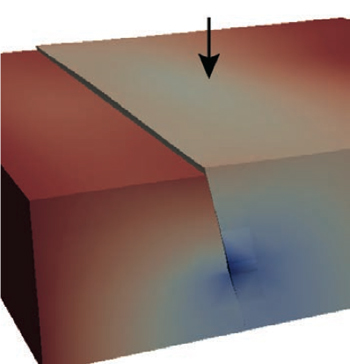
The MIT Energy Initiative (MITEI) has announced its latest round of seed grants to support early-stage innovative energy projects. This year’s winners address a wide range of topics including thermoelectric materials, energy storage, energy-efficient algorithms, carbon dioxide (CO2) capture and conversion, energy-harvesting devices, and petroleum reservoir management.
A total of more than $2 million was awarded to 14 projects, each lasting up to two years. The funded projects span four of MIT’s five schools and nine departments.
As in the past, the call for proposals welcomed submissions on any energy-related topic, but this time, MITEI’s industry members particularly encouraged projects focusing on “big data.” In response to the call, MITEI received a total of 54 proposals. Some of the funded projects are highlighted in the following paragraphs.
- Much discussion is focusing on geological CO2 sequestration for climate change mitigation and on hydraulic fracturing for shale gas production—technologies that both rely on the manipulation of fluids and pore pressure underground. One concern is whether the pressure changes involved can induce “fault slip” that could enhance the permeability of faults, creating leakage conduits for CO2, methane, or brine. Ruben Juanes of civil and environmental engineering and Bradford Hager of earth, atmospheric, and planetary sciences are conducting experiments that will elucidate key physical mechanisms controlling multiphase flow during fault slip. Their work should shed new light on fundamental questions such as when a fault becomes more permeable and when it instead “heals,” thereby preventing fluid flow.
- Almost 20% of current World Bank lending is allocated to transportation infrastructure projects. However, little is written about what happens to economic growth and energy demand in developing countries when their transportation facilities are improved. To clarify that interrelationship, David Donaldson of economics is developing a new methodology that draws on NASA’s archives of publicly available satellite images. With China as his example, he will use new algorithms to infer economic activity and energy use from the satellite data and will track the country’s major transportation infrastructure for the past four decades. Combining his economic, energy, and transportation data sets, he will perform a statistical analysis of the causal effect of transportation infrastructure.
- Recently, Erik Demaine of electrical engineering and computer science and his colleagues developed a new field of study called energy-efficient algorithms, which focuses on writing procedures for solving computational problems using minimal energy as well as minimal computer time and memory. With previous MITEI funding, they devised theoretical models that enabled them to write new algorithms that would significantly reduce the energy used in everyday tasks such as sorting and organizing data. Their new work focuses on computations involved in processing big data, for example, to run network routers, perform web searches, or analyze huge scientific databases. The researchers anticipate that the promised energy savings should inspire new computer hardware designs that can take advantage of their energy-efficient algorithms.
- A standard method of locating subsurface oil and gas reservoirs involves sending sound waves deep into the earth and recording reflected signals at an array of receivers. But “inverting” the resulting seismic data to generate an image of the subsurface is challenging. Laurent Demanet of mathematics is examining a new approach to the inversion process that draws on interferometry—a mathematical technique involving the use of cross-correlations and other quadratic combinations of raw waveform data. Such data combinations show an intrinsic robustness, even in the presence of uncertainties. Applied to seismic data, interferometric inversion should give rise to sharper images of the subsurface in a variety of real-world situations.
- The full benefit of large worldwide investments in renewable energy-producing systems cannot be realized without distributed energy storage to control the interactions of these intermittent, locally available systems with the electric grid. Fikile Brushett of chemical engineering believes that flow-based electrochemical energy storage systems may offer the best combination of efficiency, cost, and scalability. He is now investigating the feasibility of an immiscible organic and aqueous liquid flow battery by examining how electrolyte composition and concentration affect the physiochemical and electrochemical properties at the liquid interface. This architecture enables high-voltage operation (greater than 2 volts), with improved energy density over present systems, and would eliminate the need for costly ion-selective membranes and stainless steel balance-of-plant components.
- Much attention now focuses on thermoelectric devices that can generate electricity from waste heat with no combustion or moving parts. But the thermoelectric materials being considered are generally scarce, expensive to extract, and toxic. Antoine Allanore and Jeffrey Grossman of materials science and engineering are investigating the potential of a different class of materials, namely, molten salts, which are earth-abundant, affordable, and potentially highly efficient at converting heat into electricity. By combining computational and experimental studies, they will develop thermodynamic prediction tools and data that will make possible the design of a molten thermoelectric system capable of using high-temperature waste heat from sources such as incinerators, cement kilns, and steel mills.
- To limit CO2 emissions from fossil fuel combustion, Alexie Kolpak of mechanical engineering and her colleagues are designing an effective chemical catalyst to convert CO2 to cyclic carbonates, a class of compounds used in numerous industrial-scale applications. Their approach involves a new paradigm in “tunable” catalysts that offer the potential for controlled, real-time, reversible changes in atomic-scale surface structure and reactivity. Their new catalytic system could enable large-scale chemical sequestration of CO2, which is currently impractical because CO2 molecules are highly stable. Benefits include capturing CO2 directly from the emissions source, lowering the barrier for on-site conversion into cyclic carbonates, and producing an economically valuable product to offset the cost of implementing the new technology.
- Existing methods to assess the benefits of regulating pollutants for air quality goals often rely on simplified representations of atmospheric chemical processes. Use of these simplified analyses in crafting regulations can overestimate the outcomes achieved, for example, by not recognizing that tightening emissions controls may have declining impacts on pollutant formation due to interactions among different chemicals. Noelle Selin of engineering systems, Susan Solomon of earth, atmospheric, and planetary sciences, and John Reilly of the Joint Program on the Science and Policy of Global Change are developing, testing, and applying a new generation of tools that account for these chemical interactions and improve the accuracy of cost-benefit analyses for air pollution policies.
Funding for the new grants comes chiefly from MITEI’s Founding and Sustaining Members, supplemented by funds from John M. Bradley ’47, SM ’49 and an anonymous donor, and gifts from other generous alumni. Alumni contributions help expand the scope of the Energy Research Seed Fund Program and enable participation of faculty from across the Institute.
To date, the seed fund program has supported 117 early-stage research proposals, with total funding of more than $14 million.

This graphic shows ground deformation and fault slip created by fluid injection underground, as predicted by a coupled flow-geomechanics simulation. Colors denote horizontal displacements in the direction perpendicular to the fault. Ruben Juanes and Bradford Hager aim to elucidate the potential for fluid leakage along such faults.
Recipients of MITEI seed grants, spring 2013
Earth Abundant Molten Thermoelectric Materials
Antoine Allanore, Jeffrey C. Grossman, Materials Science and Engineering
An Immiscible Organic | Aqueous Liquid Flow Battery for Stationary Energy Storage
Fikile R. Brushett, Chemical Engineering
Energy-Efficient Algorithms for Big Data
Erik Demaine, Martin Demaine, Electrical Engineering and Computer Science
Interferometric Waveform Inversion
Laurent Demanet, Mathematics
How large is the impact of transportation infrastructure on economic growth and the demand for energy? A new perspective from China, as seen from outer space, 1972-2011
David Donaldson, Economics
Hybrid Energy Harvesting Devices
Silvija Gradecak, Materials Science and Engineering
Enhanced Pseudo-Capacitors for Energy Storage and Water Treatment
T. Alan Hatton, Gregory C. Rutledge, Chemical Engineering
Quantifying leakage risks in geological CO2 sequestration and shale-gas production
Ruben Juanes, Civil and Environmental Engineering; Bradford Hager, Earth, Atmospheric and Planetary Sciences
Dynamically Tunable Catalysts for CO2 Capture and Conversion to Cyclic Carbonates
Alexie Kolpak, Mechanical Engineering
MACE-Meter: Multi-utility Access Consumption Evaluation Meter
Steven B. Leeb, Electrical Engineering and Computer Science
Acetic acid from methane: Coupling methane oxidation and carbonylation on Cu-exchanged zeolites
Yuriy Roman, Chemical Engineering
Improving Methods to Assess Multipollutant Regulatory Outcomes
Noelle Selin, Engineering Systems Division; Susan Solomon, Earth Atmospheric and Planetary Sciences; John Reilly, Management
Advanced Thermal Storage with Water Stable MOFs for Building Climate Control
Evelyn Wang, Mechanical Engineering
Optimum decision-making in reservoir management using reduced-order models
John R. Williams, Civil and Environmental Engineering
This article appears in the Spring 2013 issue of Energy Futures.